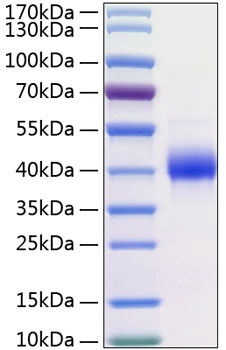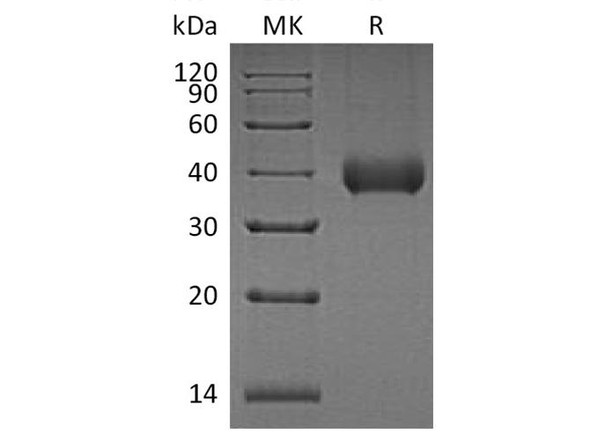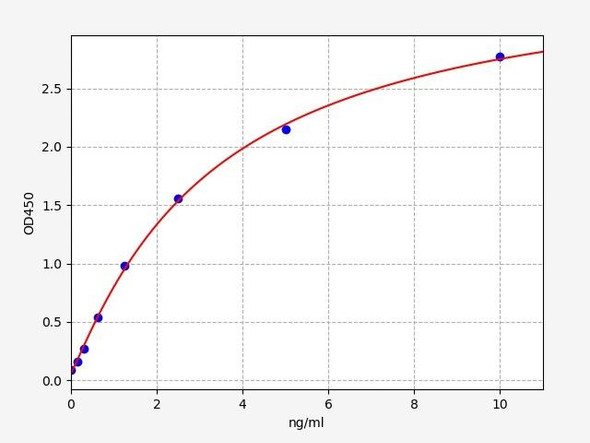Description
Recombinant Human Kallikrein-11/KLK11 Protein
The Recombinant Human Kallikrein-11/KLK11 Protein is a biologically active recombinant protein that plays a significant role in various cellular processes and signaling pathways in human biology. This protein is widely employed in immunological research, cell biology studies, protein-protein interaction analyses, and therapeutic development, providing researchers with a reliable tool for investigating Kallikrein-11/KLK11 function and its implications in health and disease.
This product (SKU: RPCB0196) is produced using HEK293 cells and features a C-His tag for convenient detection and purification. The protein exhibits a calculated molecular weight of 28.14 kDa with an observed molecular weight of 40 kDa under denaturing conditions, achieving ≥ 90 % as determined by SDS-PAGE.. Functional bioactivity has been validated through rigorous quality control assays, confirming its suitability for demanding research applications.
Key Features
| High Purity by Affinity Chromatography | |
| Mammalian & Bacterial Expression Systems | |
| High lot-to-lot consistency via strict QC |
| Product Name: | Recombinant Human Kallikrein-11/KLK11 Protein |
| SKU: | RPCB0196 |
| Size: | 10 μg , 20 μg , 50 μg , 100 μg |
| Reactivity: | Human |
| Synonyms: | KLK11, PRSS20, TLSP |
| Tag: | C-His |
| Expression Host: | HEK293 cells |
| Calculated MW: | 28.14 kDa |
| Observed MW: | 40 kDa |
| Gene ID: | 11012 |
| Protein Description: | High quality, high purity and low endotoxin recombinant Recombinant Human Kallikrein-11/KLK11 Protein (RPCB0196), tested reactivity in HEK293 cells and has been validated in SDS-PAGE.100% guaranteed. |
| Endotoxin: | < 0.1 EU/μg of the protein by LAL method. |
| Purity: | ≥ 90 % as determined by SDS-PAGE. |
| Formulation: | Lyophilized from a 0.22 μm filtered solution of 20mM Tris,150mM NaCl, pH 8.0.Contact us for customized product form or formulation. |
| Bio-Activity: | Measured by its ability to cleave a colorimetric peptide substrate, N-carbobenzyloxy-Lys-ThioBenzyl ester (Z-Lys-SBzl), in the presence of 5,5’Dithio-bis (2-nitrobenzoic acid) (DTNB). The specific activity is >141.40 pmol/min/μg. |
| Reconstitution: | Centrifuge the vial before opening. Reconstitute to a concentration of 0.1-0.5 mg/mL in sterile distilled water. Avoid vortex or vigorously pipetting the protein. For long term storage, it is recommended to add a carrier protein or stablizer (e.g. 0.1% BSA, 5% HSA, 10% FBS or 5% Trehalose), and aliquot the reconstituted protein solution to minimize free-thaw cycles. |
| Storage: | Store at -20℃.Store the lyophilized protein at -20℃ to -80 ℃ up to 1 year from the date of receipt. After reconstitution, the protein solution is stable at -20℃ for 3 months, at 2-8℃ for up to 1 week. |
kallikrein-related peptidase 11 (KLK11), also known as hippostasin, trypsin-like serine protease and PRSS20, is a member of human tissue kallikrein family. It is a subgroup of serine proteases with diverse physiological functions, which is implicated in carcinogenesis and some have potential as novel cancer and other disease biomarkers.The KLK11 gene is one of the fifteen kallikrein subfamily members located in a cluster on chromosome 19.Two alternatively spliced forms exist, resulting in 250 (isoform 1) and 282 (isoform 2) amino acid sequences,respectively. Isoform 1 is predominantly expressed in brain whereas isoform 2 is preferentially expressed in prostate. KLK11 is a novel marker for ovarian and prostate cancer carcinomas. Recombinant human KLK11, after being activated by thermolysin, is active against a thioester substrate. This activity can be inhibited by AEBSF dichloroisocoumarin, and aprotinin.







